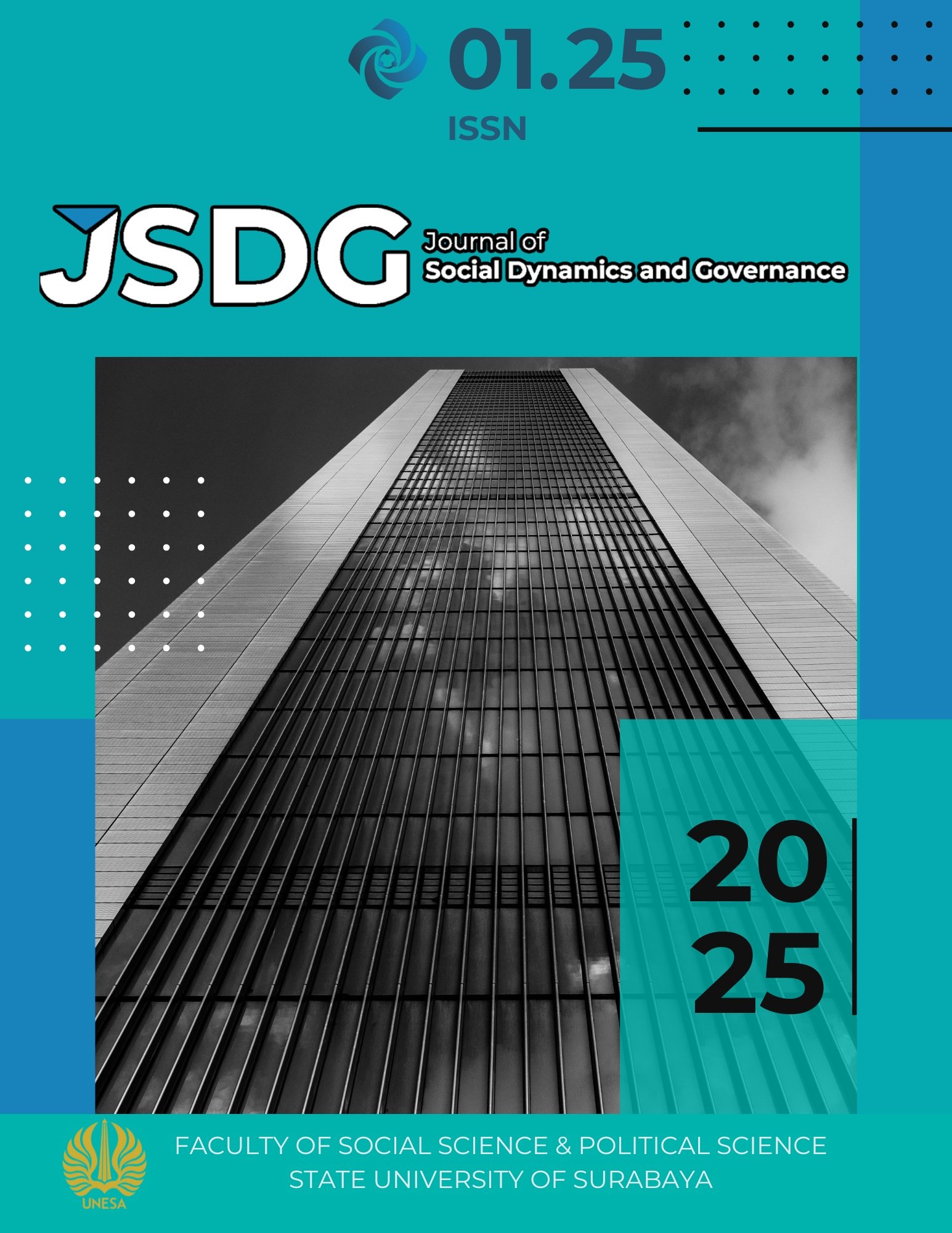The Nigeria's Civil-Military Relations and Securities Challenges
DOI:
https://doi.org/10.26740/jsdg.v2i1.38838Kata Kunci:
Boko Haram, Civil-Military Relations, Communal Violence, Niger Delta Militancy, Security ChallengesAbstrak
Nigeria's civil-military relations remains complex that characterized by the insecurity and human rights abuses, including the extra-judicial killing influenced by the country's history of transitions to civilian governments. This study examines the challenges facing Nigeria’s civil-military relations including conflicts, security challenges such as Kidnapping, Fulani-herdsmen, Boko Haram insurgency, Niger Delta militancy, and various communal violence that made the country tagged as one of the unsafe country in the continent. The study argues that these challenges have deteriorated the trust between the military and civilian authorities, increased tensions between the military and civilian populations, and resulted in significant insecurity to the Nigeria nation. To address these challenges, the study recommends strengthening civilian oversight of the military, improving military-civil relations through dialogue and education, and addressing the root causes of conflicts. The study concludes that effective civil-military relations are critical to addressing Nigeria's security challenges and promoting stability, security, and development.
Referensi
Abdel Aziz, G. A. (2023). The Saudi–US Alliance challenges and resilience, 2011: 2019. Review of Economics and Political Science, 8(3), 208–225. https://doi.org/10.1108/REPS-04-2019-0057
Ademoyega, A. (1981), Why we Struck: The Story of the First Nigerian Coup. Ibadan: Evans Brothers. Desch, M.C. (1999), Civilian Control of the Military: The Changing Security Environment. Baltimore; the Johns Hopkins University Press
Ademoyega, A. (1981). Why We Struck: The Story of the First Nigerian Coup. Evans Brothers. Articles
Agbese, P. O. (2007). Civil-Military Relations in Nigeria's Fourth Republic. Journal of Contemporary African Studies, 25(2), 151-173.
Akinbobola, O. (2013). Civil-Military Relations in Nigeria: An Examination of the Fourth Republic. Journal of Social Sciences, 36(2), 131-144.
Andreeva, A. A. (2024). Functions of the Spanish Army in Domestic and Foreign Policy. Iberoamerica (Russian Federation), 2, 90–113. https://doi.org/10.37656/s20768400-2024-02-05
Breuer, A., Leininger, J., Malerba, D., & Tosun, J. (2023). Integrated policymaking: Institutional designs for implementing the sustainable development goals (SDGs). World Development, 170, 106317. https://doi.org/10.1016/j.worlddev.2023.106317
Ebo, A. (2005), Towards a Code of Conduct for Armed and Security Forces in Africa: Opportunities and Challenges; DCAF Policy Paper, Geneva.
Eme, O. I. (2014). Civil-Military Relations in Nigeria: Challenges and Prospects. Journal of African Studies and Development, 6(3), 55-67.
Eme, O. and Ogbochie, A. (2013), Stemming Impunity in Appointment in Nigeria: A Case of the Sack of Service Chiefs. University of Nigeria.
Egbujiobi, A. E. (2025). Sustainable Development and Internal Security in Nigeria : The Role of Civil- Military Relations. Review of Education, Administration and Law (REAL), 8(1), 149–163. https://doi.org/10.47067/real.v8i1.413
Fayemi, J.K. (1998), The Future of Demilitarisation and Civil-Military Relations in West Africa: Challenges and Prospects for Democratic Consolidation. African Journal of Political Science, Vol.3, no.1. Finer, S. (1962),
Jeshurun, C. (1989). Civil‐Military Relations and National Security in ASEAN. Pacific Focus, 4(2), 75–98. https://doi.org/10.1111/j.1976-5118.1989.tb00072.x
Kachifo Limited. Taylor, E.R. (1998), Command in the 21 st Century: An Introduction to Civil-Military Relations, Unpublished Thesis Naval Postgraduate School, Monterey, California.
Kennedy, O. (2024). Civil-Military Relationship and the Fight Against Security Challenges in Nigeria. 1, 18–30.
Morgan-Owen, D., & Gould, A. (2022). The politics of future war: Civil-military relations and military doctrine in Britain. European Journal of International Security, 7(4), 551–571. https://doi.org/10.1017/eis.2022.10
Nainggolan, P. P., & Katharina, R. (2020). Poor Post-Legislative Scrutiny of Security Sector Reform and Its Impacts on Human Rights and Civil-Military Relations in Indonesia. Journal of Southeast Asian Human Rights, 4(1), 28–51.
https://doi.org/10.19184/jseahr.v4i1.13597
Obasanjo, O. (2014). My Watch: Political and Public Affairs. Kachifo Limited.
Okeke, R. C., & Muoneke, C. V. (2024). A Tale of Two Tastes : Contradictions of Civil-Military Cooperation in Nigeria. January.
https://doi.org/10.56201/jpslr.v9.no3.2023.pg227.235
Oluleye, J. (2011). Military Leadership and Civil-Military Relations in Nigeria, 1960-2007. University of Ibadan Press.
Pall Mall. Huntington, S. (1957), Theory and Military Effectiveness. Journal of Public Administration and Management, vol. 10, no.2. Obasanjo, O. (2014), My Watch: Political and Public Affairs. Vol.2 Lagos, Nigeria
Rivera-Páez, S., & Uribe-Cáceres, S. (2022). Military identity and civil-military relations in Colombia: the 2014 presidential campaign case. Revista Cientifica General Jose Maria Cordova, 20(39), 447–466. https://doi.org/10.21830/19006586.887
Roka, H. (2022). Why Oppose the Millennium Challenge Corporation in Nepal? World Review of Political Economy, 13(3), 401–413.
https://doi.org/10.13169/worlrevipoliecon.13.3.0401
Soldier and the State. Cambridge: Havard University Press. Niesel, S.C. (2005), Civil-Military Relations
Shchokin, R., Soloviov, O., & Tantsiura, I. (2023). Strengthening Cooperation between the Civilian and Military Sectors In the Context of State Security: Benefits and Challenges. Revista de Cercetare Si Interventie Sociala, 83, 155–170.
https://doi.org/10.33788/rcis.83.11
Titko, E., Kurovska, I., Korniienko, P., Balzhyk, I. A., & Stoyatska, G. M. (2023). Civil-Military Cooperation and Gender Perspectives: European and Ukrainian Realities. Revista Direito e Sexualidade, 4(2), 34–61. https://doi.org/10.9771/rds.v4i2.53892
Wilén, N., & Strömbom, L. (2022). A versatile organisation: Mapping the military’s core roles in a changing security environment. European Journal of International Security, 7(1), 18–37. https://doi.org/10.1017/eis.2021.27
Unduhan
Diterbitkan
Cara Mengutip
Terbitan
Bagian
 Abstract views: 499
,
Abstract views: 499
, PDF Downloads: 165
PDF Downloads: 165



